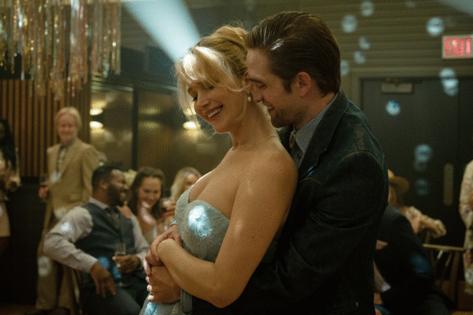Commentary: Jennifer Lawrence is right about politics in Hollywood
Published in Entertainment News
Jennifer Lawrence is promoting her latest film, a psychological drama called "Die My Love," but her opinions on the current political climate, and how artists can best address it, may be the most thought-provoking and discussion-worthy element of her media tour.
Lawrence isn’t known for being shy about her politics. She recently told the New York Times that “During the first Trump administration, I felt like I was running around like a chicken with my head cut off,” explaining that she had a lot to say about the president at the time. But she questioned whether she “should” continue speaking out, noting that “as we’ve learned, election after election, celebrities do not make a difference whatsoever on who people vote for. So then what am I doing? I’m just sharing my opinion on something that’s going to add fuel to a fire that’s ripping the country apart.”
“So then what am I doing?” is a poignant question that anyone in Hollywood who wants to make a lasting difference should be asking themselves (if they aren’t already), especially when the very idea of a “celebrity” has changed. Social media influencers and podcasters — the likes of which have been credited with helping President Donald Trump secure a second term — now seem to have more influence than the Jennifer Lawrences of the world.
One way forward could be in what she said next: “I don’t want to start turning people off to films and to art that could change consciousness or change the world because they don’t like my political opinions.”
It would be easy to write that off as another example of Hollywood biting its collective tongue to avoid disrupting its bottom line. In the current era of media giants paying costly settlements for nuisance suits brought by Trump and pulling his most vocal critics off the air, many are watching their words more carefully.
But thinking of Lawrence’s comments as merely a way to protect her marketability would be too dismissive. Another possible reading is that political messages are more likely to resonate if they are part of the art, rather than explicitly pontificated by the artist. It’s a compelling and persuasive idea in a polarized moment like this one. Actors like Lawrence may find that expressing conviction through thoughtful, nuanced, even provocative roles carries more weight than soapboxing at awards shows and in media appearances.
Take, for example, "One Battle After Another." It’s probably the most political movie of the year, but you wouldn’t have known that in advance. The film’s marketing played up its star power and action elements instead of its politics. Director Paul Thomas Anderson and star Leonardo DiCaprio mostly talked about process and filmmaking craft in their promotional interviews, rather than framing it as a manifesto about Trump’s America.
As a result, certain audiences engaged with its politics, while some missed them entirely. Others (such as Ben Shapiro and his fellow right-wing cultural commentators) didn’t seem to catch on until the film had been out long enough that they couldn’t hurt its financial prospects.
Many viewers take issue with sneaking messaging into films and shows — and some studios might be reluctant to greenlight political work, particularly in the current media landscape where lawsuits and consolidations don’t incentivize risk-taking.
But history shows us that some of the savviest and most effective social commentary has been smuggled into entertaining, mainstream films, often within the confines of genre: the anti-capitalism of "They Live," the anti-consumerism of "Fight Club," the trans subtext of "The Matrix," the Watergate-era paranoia of "The Parallax View," the LGBTQ+ inclusion of "The Rocky Horror Picture Show," the media critique of "Videodrome," the explorations of post-Obama-era racism in "Get Out."
To give another example, "Anchorman" was sold and received as a broad, goofy comedy when it was released in 2004, but co-writer/director Adam McKay has admitted that the screenplay was written in response to the policies of the George W. Bush administration. (I, for one, would argue that it sends them up much more successfully than in McKay's later, much more straightforward Bush-era takedown, "Vice").
"Anchorman" may not have immediately transformed the political views of its target audience, which was more likely to quote its catchphrases than to go canvass for John Kerry. But in the long-term, it may have changed how they thought about confident know-nothings in positions of power.
Speaking through the art instead of the artist isn’t a foolproof method of changing hearts and minds — there’s always a chance that audiences may misinterpret the message, or that it will fly over their heads. But done well, thought-provoking, subversively political art can reflect a national mood and character, and ultimately (if subtly) influence it.
____
This column reflects the personal views of the author and does not necessarily reflect the opinion of the editorial board or Bloomberg LP and its owners.
Jason Bailey is a film critic and historian. He is the author, most recently, of "Gandolfini: Jim, Tony, and the Life of a Legend."
©2025 Bloomberg L.P. Visit bloomberg.com/opinion. Distributed by Tribune Content Agency, LLC.













Comments